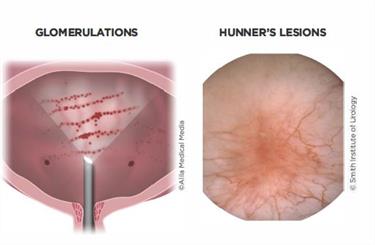About IC/BPS
 | |
IC/BPS occurs in three to seven percent of women, and can affect men as well. Though usually diagnosed among women in their 40s, younger and older women have IC/BPS, too. It can feel like a constant bladder infection. Symptoms may become severe (called
a "flare") for hours, days or weeks, and then disappear. Or, they may linger at a very low level during other times.
Individuals with IC/BPS may also have other health issues such as irritable bowel syndrome, fibromyalgia, chronic headaches,
and vulvodynia. Depression and anxiety are also common among women with this condition.
Causes of IC/BPS
The cause of IC/BPS is unknown. It is likely due to a combination of factors. IC/BPS runs in families and so may have a genetic factor. On cystoscopy, the doctor may see damage to the wall of the bladder. This may allow toxins from the urine to seep into the delicate layers of the bladder lining, causing the pain of IC/BPS. Other research found that nerves in and around the bladder of people with IC/BPS are hypersensitive. This may also contribute to IC/BPS pain. There may also be an allergic component.
Urinary urgency ("gotta go right now") and urinary frequency ("gotta go often") are common-both during the day and at night. Many women feel a constant need to empty their bladders to relieve the intensity of the pain. Women with IC/BPS rarely leak urine but go often to decrease pain. IC/BPS flares are common during the menstrual period. Flares also occur during times of emotional or physical stress. Some women note symptoms specifically in their urethra. For them, urinating can feel like pushing sharp pieces of glass into the tissue.
When cystoscopy is performed on women with IC/BPS, the bladder appears inflamed and irritated. Pinpoint sites of bleeding (glomerulations) can be seen on the bladder wall. A small number of women have a specific type of lesion, known as Hunner's lesion. Cracks in the lining of the bladder are also often visible.
The IC/BPS Bladder
Symptoms of IC/BPS vary from woman to woman. However, most experience pain, pressure and discomfort as the bladder fills. In addition, chronic pain or pressure in the pelvis and perineum are common, including discomfort and pain during sexual intercourse. The severity of symptoms is variable.
For more information about IC/BPS download this PDF.
